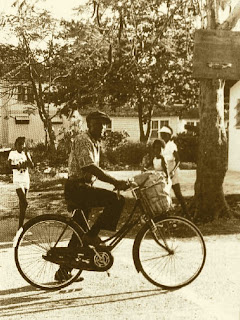
 What's crazier than Joseph Spence hammering away at his guitar and garbling verses in multiple layers of syncopation? His whole family doing it with him!
What's crazier than Joseph Spence hammering away at his guitar and garbling verses in multiple layers of syncopation? His whole family doing it with him!Here is a picture of Joseph Spence with his sister, Edith Pinder, in the background, and her husband Raymond in the foreground. The Pinder family often accompanied Spence, and together they were nothing short of a veritable music machine. Edith sang in a powerfully deep and throaty tenor that reminds me of a Jamaican reggae singer. Her husband Raymond provided a deep and rich bass, while their daughter Geneva warbled along in a flighty treble. You just have to hear them to understand, but I'm telling you it's unbelievable stuff. They sang with an incredible intensity that at times can be almost overwhelming to listen to. The music is simple, but the complexities are astounding. It's truly a wonder to behold. If you've ever heard The Incredible String Band or The Grateful Dead performing their versions of "I Bid You Goodnight" then you've heard their tribute to the Pinder Family. These groups heard the song on an album called The Real Bahamas, a 1965 Nonesuch Records release which has since been re-released. Other musicians who claim Joseph Spence as an influence include Ry Cooder and Taj Mahal, both of whom had the pleasure to meet and play with him before his death in 1984.-- from http://spence.bryandeno.com/

Spence, as he was endearingly called by his siblings, his wife and inevitably everyone who came to know him, was raised with his sister and four half-brothers. In his youth, the Out Islands were still largely unpopulated, this meant that there was no access to mainland music. The influences that Joseph Spence did absorb came in the form of Baptist anthems, rhyming spirituals, Tin Pan alley songs, Trinidadian calypso, children's songs and even Christmas carols. The ingenious guitarist broke new ground finding ways to combine and derive these musical genres into a format that better suited his own voice.-- The Nassau Guardian "Joseph Spence: The Unforgotten Legend"
The gifted Androsian was most heavily influenced while still in his teens, during a stint as a sponge hooker. Spence would take his guitar with him on these trips. The men whom he accompanied would often spend months at a time out in the "Mud" - the shallow waters where natural sponges were often found and harvested. The choral style developed on the Out Islands known as "rhyming" emerged when spongers were unable to return back to port in time for Sunday fellowship. Instead, they took bible verses, a few basic chords as well as an innate sense of rhythm adaptability and sang out their own service and prayers on the boats, utilisng a call and response format. Spence took hold of the approach and transformed it into something of his own creation. The teenager left the sponge industry one year before the great sponge blight in 1938, which wiped out 90 percent of the Bahamas' sponge population.
...
The very first time that Charters heard Joseph Spence playing he was sitting on a wall at a construction site. Charters is said to have checked behind the wall for another guitarist, so layered and rich was Spence's finger picking approach.
Some years later, in 1964, Fritz Richmond of the Jim Kweskin Jug Band visited the islands on behalf of Vanguard Records as a sort of fact finding trip to see if Joseph Spence was still around. Upon locating the elusive Spence, Richmond sent a a telegram back to the record company saying, "Spence lives. Bring 12 sets of metal bronze strings and a tape recorder."
About the album: Review by Roundup newsletter
These recordings come from two separate occasions. Six tracks were recorded in New York City during Joseph Spence's first tour of the U.S., and prominently feature Spence's guitar and vocals, with harmonies and occasional lead vocals from his sister Edith Pinder. The other seven selections were recorded at the same sessions that yielded the Nonesuch Real Bahamas album, recorded in the backyard of the Pinder family, with Spence accompanied by incredible vocals from the Pinder family, Edith, Raymond, and Geneva. Their vocals have the same rough-hewn rightness as Spence's guitar, and the voices intertwine and create spontaneous counterpoint like some sort of coarse Bahamian vocal Dixieland ensemble. Or, as Jody Stecher says in the liner notes, "When the Pinders sing 'When Jesus Calls Again' they remind me of a big old living pump organ, complete with leaks and squeaks, and completely irresistible."
This is incredibly joyous, complex, ecstatic, and jubilant music. It's about the most fun that religion ever got. And, if you listen close, you'll find that their polyrhythmic rhyming is the unknown precursor to rap.
 Joseph Spence & The Pinder Family - The Spring of Sixty-Five
Joseph Spence & The Pinder Family - The Spring of Sixty-FiveYear: 1992
Label: Rounder
say what?
mp3 >192kbps vbr | w/ cover | 61mb
see my earlier post on Joseph Spence for more of my writing, and less of other peoples'.

Hi! I've seen your comment in my blog and came to visit yours. Really nice stuff, my friend! I'm very interesting in the kind of music that you post in your blog. Some of the musicians are unknown for me (and that's the good thing about the music blogs), and others like John Renbourn or so, they are always welcome in my ears. Music it's a really wide, wide world. And wonderful, indeed. Best regards ! www.nestorbarron.blogspot.com
ReplyDeleteDownloaded and listened, blown away, upward, towards the moon and the stars.
ReplyDeleteThis album has brought me great joy.
Thank you so much.